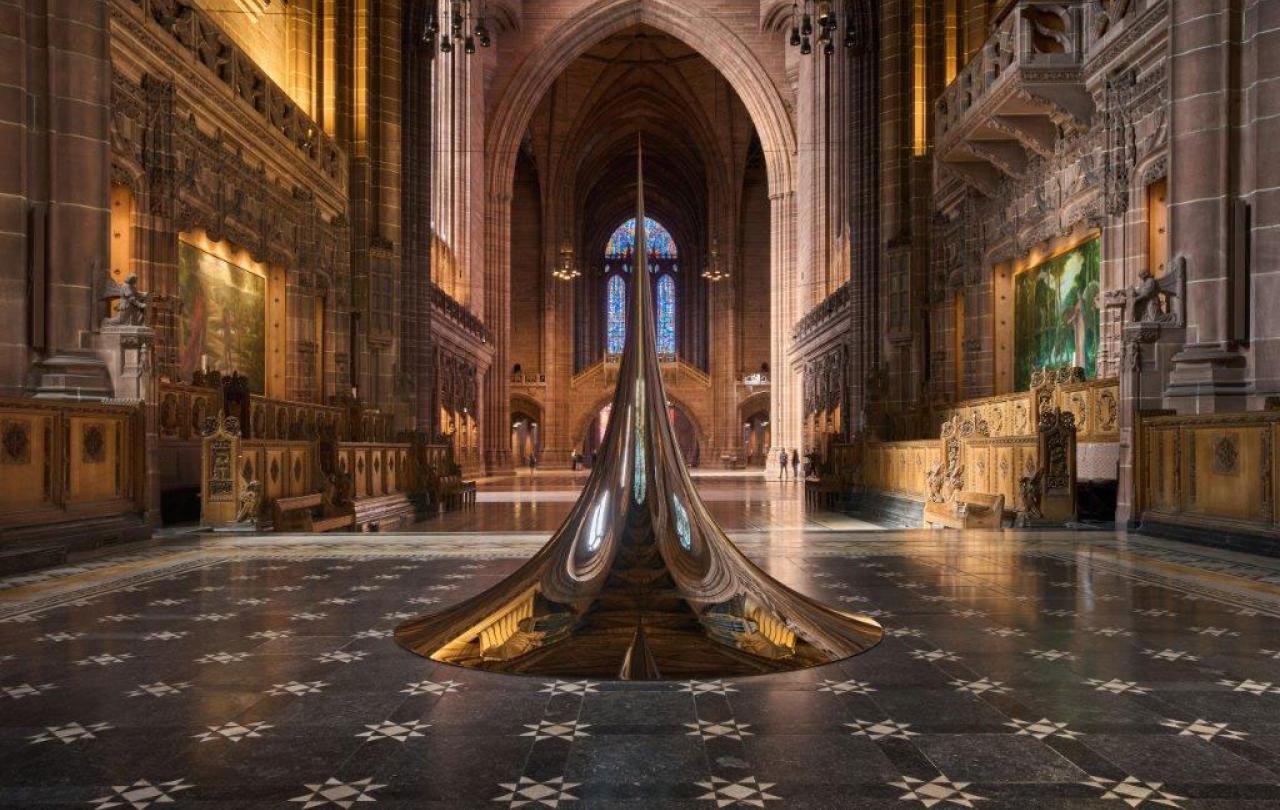
In the summer of 2024 thousands of visitors came to Liverpool Cathedral and encountered the challenging artwork of celebrated international artist Anish Kapoor. In his first exhibition in Liverpool for over 44 years these works were displayed as part of our centenary celebrations.
They caused a stir. Some were moved, some were confused, many were impressed but there were not many who entered our building that did not have an opinion. As a surprise to us we did not get many questioning why we allowed these pieces into the sacred presence of a cathedral church disrupting the places where worship occurs. Most recognised that this carefully curated exhibition used its artwork to speak to both the building and the pieces themselves.
But we must ask ourselves the question what is the point? What does a vibrant worshipping community such as Liverpool Cathedral stand to gain? Our architecture is impressive, you can’t miss us in the city so why rock the boat by bringing in work from an artist of great renown and great controversy?
The creativity comes through the careful curation of work that speaks to the human condition and ultimately our relationship with God.
The answer surely lies in two places.
Firstly, there’s the long tradition the church has in using art to tell Jesus’s story to the world. Visit any church and you will likely see a stained-glass window impressively depicting a biblical story like a medieval Banksy. Our worship services can be seen as theatre and performance with choreographed liturgical movements, stunning choral pieces or magnificent contemporary music. The communion prayer acts like a Shakespearian soliloquy retelling the dramatic story of Jesus’s death and resurrection. Art and theatre are intermeshed with the church. Liverpool Cathedral has a number of permanent and temporary art works including work from Elizabeth Frink and our iconic Tracey Emin neon light.
Secondly, like most cathedrals in the modern age Liverpool Cathedral walks the precarious path between commerciality and spirituality. To be sustainable without regular governmental support we must raise substantial money far beyond the reach of the traditional giving of a congregation. We need to be creative, we need to do things, put on events, host exhibitions to reach beyond the bounds of a traditional church audience and connect with a wider public.
Liverpool Cathedral has done this for a number of years, welcoming Luke Jerram’s Museum of the Moon before hosting his Gaia exhibition and then starting a long association with Peter Walker through Peace Doves, Identity and the very popular Light Before Christmas shows. These are not chosen simply to draw in the masses. That would be short-sighted, counterproductive and create the false narrative that cathedrals are more interested in money rather than the worship of God.
In Liverpool our attempts to attract people to these exhibitions are predicated on the notion that whatever a visitor's motivation when they arrive they will encounter us and through us encounter God. Last year 31,000 people saw our Christmas Sound and Light show and as a result that led to greater numbers coming to our Christmas Eve services. People want to make the connection, we need to help them in that.
If a cathedral is to use this work successfully it must help us and our visitors ask searching questions. Sure it is great fun to have a picture with one of these exhibits and most of what we do is deliberately Instagramable. However, the creativity comes through the careful curation of work that speaks to the human condition and ultimately our relationship with God. The museum of the moon and Gaia provoked many interesting conversations and debates about the relationship between science and faith alongside the age-old question of how creation came about.
Peace Doves brought together a post covid community trying to come to terms, both individually and collectively, with the impact of the Lockdown years. In bringing together a piece of community art we were able to focus minds on loss, healing and hope.
It isn’t direct, it isn’t overt but we are also not shy of the fact that we are a cathedral and we do God.
So, to Anish Kapoor. When he was Dean of our cathedral, Justin Welby, challenged us to think of the cathedral as a safe place to do risky things in the service of God. Many could say that hosting an exhibition by Anish Kapoor encapsulates that risk. Challenging, controversial and provocative his work attracts thought and creates a stir. The exhibition stands firmly in our tradition of using art to ask questions. The introduction to the exhibition booklet states that the exhibition encapsulates “the artist’s exploration of the physicality of the human body, the title – Monadic Singularity – reflects the interrelation of human existence and the universe” yet again showing a connection to God and our faith.
It isn’t direct, it isn’t overt but we are also not shy of the fact that we are a cathedral and we do God. People came to the Kapoor exhibition for a multitude of reasons. We had fine art students able to contextualise, theorise and talk sagely about Anish Kapoor and the meaning behind his work, we had families with young children enjoying being able to run around and interact with the works, we had people completely bemused or making wild guesses as to what it all meant. That gives an opening to help us have the conversation about the God that means so much to us and how we interpret this art in the light of our faith.
Cathedrals are places of creativity and need to remain that way. Cathedrals have the opportunity to bring many people through their doors every day. Art can do that and as we have seen since mediaeval times can help us and others understand God and their place in life.





